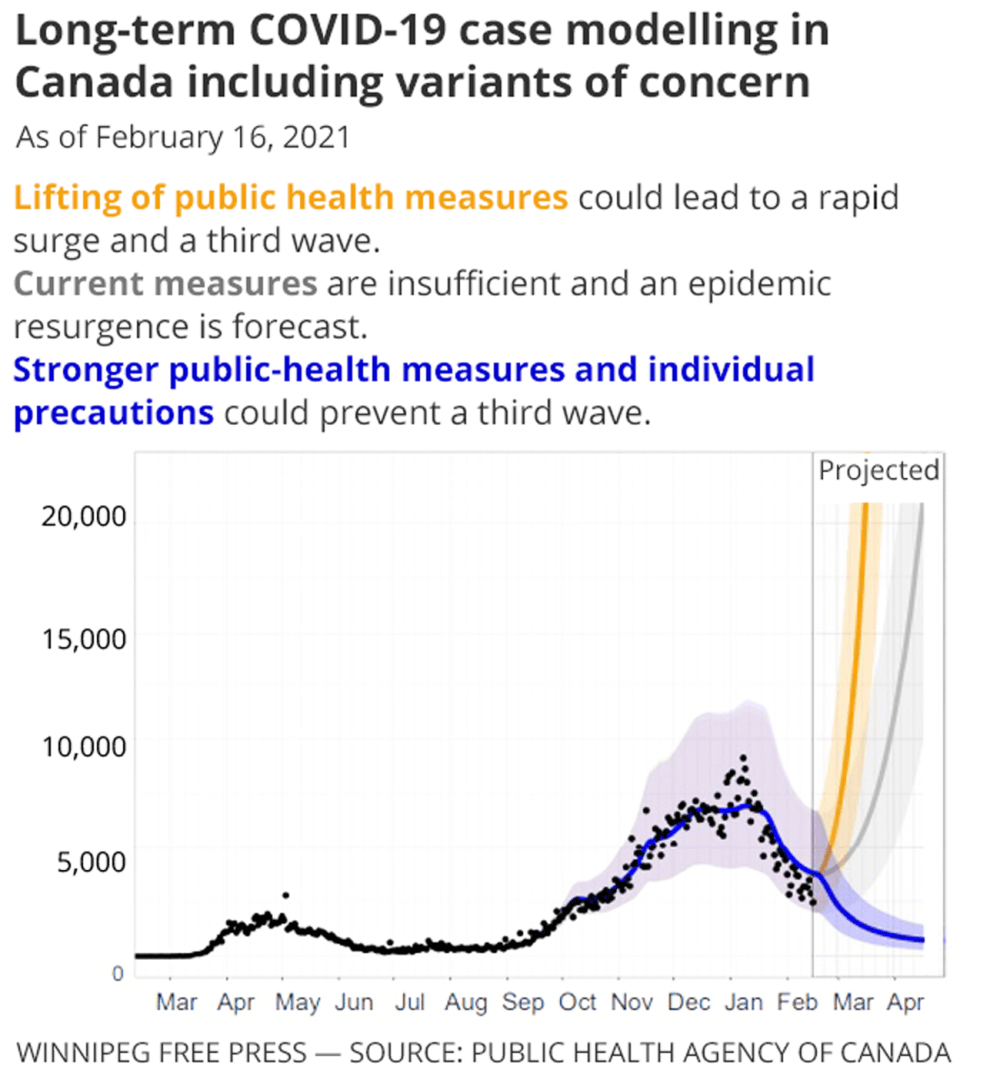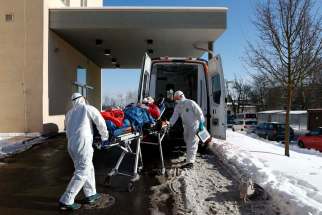Manitoba records more U.K. variant cases as concern about a third wave grows
Read this article for free:
or
Already have an account? Log in here »
To continue reading, please subscribe:
Monthly Digital Subscription
$0 for the first 4 weeks*
- Enjoy unlimited reading on winnipegfreepress.com
- Read the E-Edition, our digital replica newspaper
- Access News Break, our award-winning app
- Play interactive puzzles
*No charge for 4 weeks then price increases to the regular rate of $19.00 plus GST every four weeks. Offer available to new and qualified returning subscribers only. Cancel any time.
Monthly Digital Subscription
$4.75/week*
- Enjoy unlimited reading on winnipegfreepress.com
- Read the E-Edition, our digital replica newspaper
- Access News Break, our award-winning app
- Play interactive puzzles
*Billed as $19 plus GST every four weeks. Cancel any time.
To continue reading, please subscribe:
Add Free Press access to your Brandon Sun subscription for only an additional
$1 for the first 4 weeks*
*Your next subscription payment will increase by $1.00 and you will be charged $16.99 plus GST for four weeks. After four weeks, your payment will increase to $23.99 plus GST every four weeks.
Read unlimited articles for free today:
or
Already have an account? Log in here »
Hey there, time traveller!
This article was published 19/02/2021 (1752 days ago), so information in it may no longer be current.
Three more people in Manitoba have tested positive for the U.K. coronavirus variant — racking up more than 30 total contacts — as new federal forecasts project highly contagious variants could drive a third wave of the pandemic.
The three cases of the B.1.1.7 variant of concern, which was first detected in the U.K. last fall, have been confirmed in Manitoba by the National Microbiology Lab, said Dr. Jazz Atwal, acting deputy chief provincial public health officer.
Public health officials identified close contacts of the three people — all of whom had travelled internationally — and the number of contacts per case ranged between four and 27, he said, noting he was unable to provide specifics about the close contacts on Friday, but most are believed to be household members.
“Obviously, the number 27 is an outlier there. We were able to identify all the contacts, we followed them, some of them are still in self-isolation, and we’re looking at testing all of the contacts at day 10 as well, to ensure that there was no transmission to the contacts,” Atwal said.
All three travellers have recovered and completed their self-isolation requirements, meaning at least 10 days have elapsed since their symptoms appeared, he said.
Two new domestic flights on Jan. 26 and one flight on Jan. 30 have been added to the province’s list of public COVID-19 exposures associated with a variant of concern.
The cases are not connected to each other and are not related to Manitoba’s first B.1.1.7 case, which was reported on Feb. 9, Atwal said. No variants of concern have been connected to outbreaks in First Nations, he said.
The three new cases are in Winnipeg. No additional information was given and Atwal said the level of detail provided about the first variant case will no longer be shared. In that case, the public was told the man had travelled to Africa and Europe, among other details.
Despite the high number of close contacts, there is no risk of the variant passing from the contacts into the community at this time, the doctor said. So far, contact tracing has indicated “very little risk” of public exposure, a provincial spokesperson said.
“I think we’re managing this well from a public health perspective. These are isolated cases, there’s really less than five cases here in total, and public health was really aggressive here on the contact side and managing that and ensuring testing does take place as well,” Atwal said.
The province did not comment on whether the three people followed federal quarantine orders.
Manitoba reported two COVID-19 deaths on Friday, both people were from Winnipeg: a man in his 80s, and a woman in her 90s connected to the outbreak at Golden Links Lodge. There were 92 new cases.
Meanwhile, federal public health officials released modelling on Friday that suggests the B.1.1.7 variant could spark a national resurgence of COVID-19 capable of surpassing the high number of new cases recorded in early January.
Canada’s chief public health officer, Dr. Theresa Tam, said more contagious variants have been detected in all provinces. Without continued vigilance, the country may not be able to avoid a rapid acceleration of daily cases, predicted to hit 20,000 by mid-March.
“We are at a critical point in the pandemic and our efforts have begun to tip the balance in our favour,” Tam told reporters. “Protecting our progress and limiting the impact of variants of concern will require stronger action.”
Under current restrictions, infections in Canada could increase by more than 10,000 per day in April, according to federal modelling released Friday.
The federal forecast predicts Manitoba could report up to 375 cases a day by April if public health measures are lifted and a variant of concern is spreading at the community level.
The latest in Manitoba
Manitoba reported two COVID-19 deaths — a man in his 80s from Winnipeg and a woman in her 90s connected to the outbreak at Golden Links Lodge — and 92 new cases on Friday.
Two cases were in the Interlake-Eastern health region, 50 in Northern health, three in Prairie Mountain, two in Southern Health and 35 in Winnipeg.
Acting deputy chief provincial public health officer Dr. Jazz Atwal said there are increasing reports of individuals hosting visitors to their homes while awaiting results of a COVID-19 test despite being required to self-isolate.
Manitoba reported two COVID-19 deaths — a man in his 80s from Winnipeg and a woman in her 90s connected to the outbreak at Golden Links Lodge — and 92 new cases on Friday.
Two cases were in the Interlake-Eastern health region, 50 in Northern health, three in Prairie Mountain, two in Southern Health and 35 in Winnipeg.
Acting deputy chief provincial public health officer Dr. Jazz Atwal said there are increasing reports of individuals hosting visitors to their homes while awaiting results of a COVID-19 test despite being required to self-isolate.
Additionally, Atwal said people are not taking COVID-19 symptoms — such as a sore throat or the loss of taste and smell — seriously and and are failing to get tested early.
He reminded people to seek testing if symptoms occur, including fever and chills, cough, sore throat, loss of taste or smell, vomiting, diarrhea, runny nose, muscle aches, fatigue, pink eye, headache, skin rashes, poor feeding in an infant, and nausea or loss of appetite.
Provincewide, the five-day test-positivity rate was 5.7 per cent and 4.2 per cent in Winnipeg, and 2,389 COVID-19 tests were completed Thursday.
As of Friday, 213 people were in hospital being treated for COVID-19 including 27 patients in intensive-care. Eighty patients were infectious.
The total number of COVID-19 deaths in Manitoba is 879. A previously reported death was removed from the total due to a data correction, the province said.
The total number of lab-confirmed cases in the province since the start of the pandemic is 31,235.
Asked about the federal projections, Atwal said Manitoba is in a unique situation compared with other provinces.
So far, Manitoba has not found evidence of community spread related to the B.1.1.7 variant and public health has screened more than 1,600 COVID-19 samples this month. Ontario, by comparison, has reported 395 cases of variants of concern and Alberta has detected 239 cases.
“It puts us in a really good spot right now,” Atwal said. “From a public health perspective, our case and contact management is aggressive with this, so we’re really going after the case. We’re really going after those contacts and making sure that they are self isolating properly, so that really helps us going forward.”
As more people are given the COVID-19 vaccine in April and throughout the spring, Atwal said the effect of a variant of concern, if it were to begin spreading widely in the community, might be diminished.
“We’re going to continue to hope, and work, to make sure that that variant of concern doesn’t take hold in Manitoba to prevent those issues from happening,” he said.
Atwal would not talk about how the community transmission of the B.1.1.7 variant would affect the province’s plans to loosen pandemic restrictions, suggesting the variant may not get a foothold for another two to three months.
“We do recognize that if a (variant of concern) does take hold after a number of weeks, after a few months, basically it can become very problematic, and obviously that can impact what we do from a public health perspective,” he said.
“Let’s focus on today, let’s focus on (what) Manitoba has to do today, for the next week, for the next month, and take those steps.”
— with files from The Canadian Press
danielle.dasilva@freepress.mb.ca

Our newsroom depends on a growing audience of readers to power our journalism. If you are not a paid reader, please consider becoming a subscriber.
Our newsroom depends on its audience of readers to power our journalism. Thank you for your support.
History
Updated on Friday, February 19, 2021 2:12 PM CST: Adds new info about contacts, quotes
Updated on Friday, February 19, 2021 6:22 PM CST: Full update with new quotes, info, graphics, formatting, headline, sidebar
Updated on Friday, February 19, 2021 6:33 PM CST: Adds byline.
Updated on Monday, February 22, 2021 4:31 PM CST: Updates graphic










